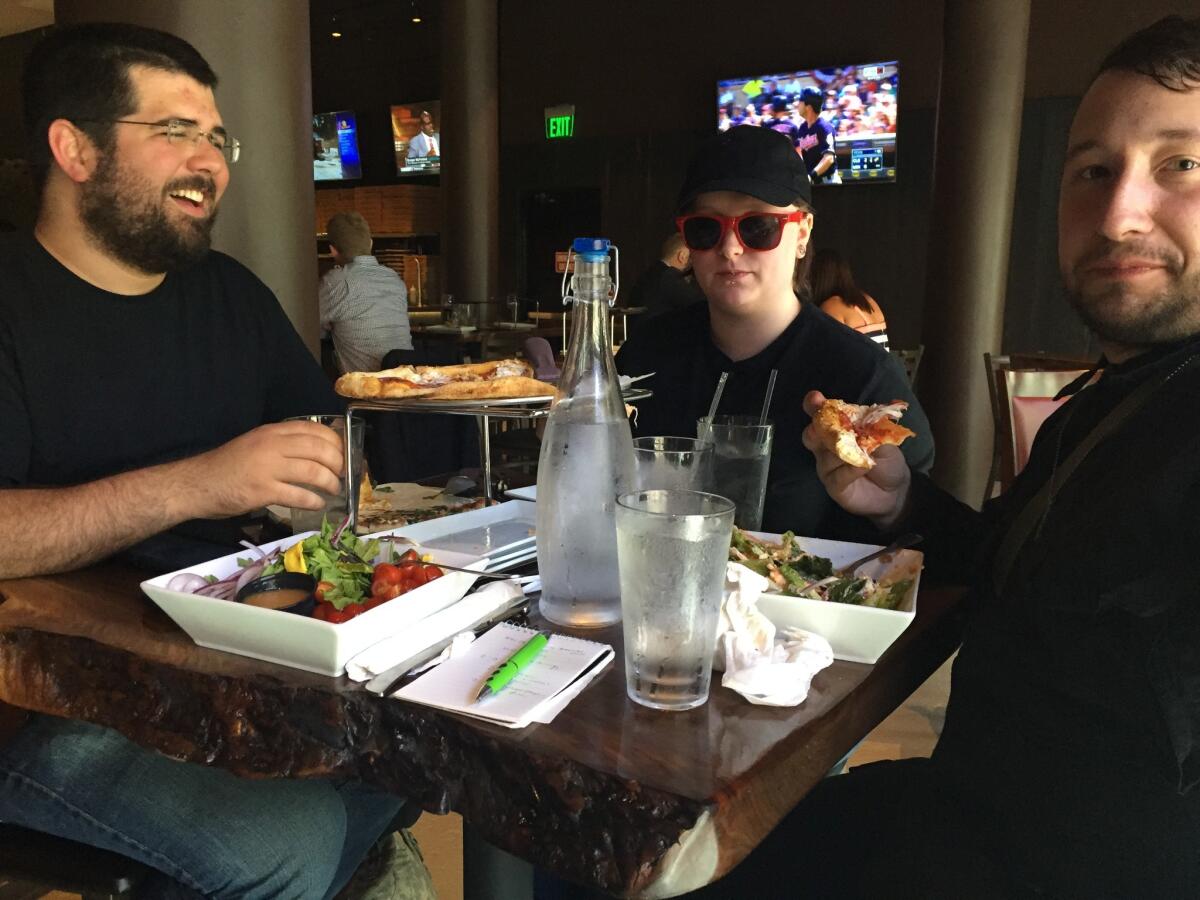I had lunch with a right-wing white nationalist group. Here’s what I learned

They were dressed in black, standing in the shade down the street from the Republican National Convention, in front of vendors selling Donald Trump hats and banners.
But they didn’t come to the convention to support Trump. The goal instead is to “subvert the GOP.”
Here’s what I learned over lunch with three young members of the year-old Traditionalist Worker Party, a group the Southern Poverty Law Center has called “virulently racist and anti-Semitic.”
They don’t actually support Donald Trump or the Republican Party.
“If you think about it, most Trump supporters are working-class white Americans. Those are our constituents,” said Matthew Heimbach, the 25-year-old chairman and co-founder of the group. “They might not be voting for us yet, but that’s only because they don’t know they have that option.”
There’s plenty Heimbach doesn’t like about Trump: He wants to spend too much on the military. His stance on immigration doesn’t go far enough. He’ll probably be ineffective in office. And so on.
“At the end of the day, he’s still part of the establishment. He’s still a capitalist.”
So they’re there to essentially convert GOP voters to their own party. Heimbach offered an analogy one might find on Amazon.com: “If you like Donald Trump, you might also like the Traditionalist Worker Party.”
They want to redraw state boundaries into “regions” that have similar ethnicities, political views and values.
Heimbach believes the country is so polarized that there’s nothing that unites Americans other than using the same currency.
“We even speak different languages,” he said.
One example: He’d like one “region,” from Pennsylvania down to the upper part of the South, running through Appalachia.
The group thinks social issues like gay marriage and abortion should be decided at regional levels like the one he’s proposed.
“Let’s stop fighting a culture war. Just declare both sides victors, and in your respective region, do what you think is best,” he said.
They’re against “forced multiculturalism,” and they want a full stop on immigration into their region.
This includes all immigration — legal and illegal.
“Zero net migration, I think would be fair,” Heimbach said.
But they don’t want to stop other regions of the country from welcoming diversity, if that’s what they want.
Then it got awkward.
“I’m an Asian person from California,” I told him. “What if I wanted to move in? Would you be like, ‘Eh, ideally you’d stay over there’?”
He nodded his head. “In your own community.”
I laughed and he added, “It doesn’t mean we can’t visit each other. I mean, visas are a thing, you know.”
They really, really don’t want to call themselves extremists.
Does he consider the group “extremist”? “I think I’m really boring.”
I repeated myself, asking if he’d disagree with people calling them extremist. Cue the longest pause of our entire conversation.
“I mean, I would say.… We are talking about values that are normal, natural and healthy,” he finally offered, avoiding a yes or no answer.
“I think [extremism] is a title thrown around to demonize whites politically organizing themselves in a peaceful manner,” Heimbach said.
Heimbach described the political center as “death.” The group’s members respected Bernie Sanders for pulling people to the left — until he endorsed Hillary Clinton.
“I never attack the far left,” he said. “The center needs to burst before we can have political revolution.”
Isn’t that a form of extremism, too? I asked.
“Well, it’s essentially happening, though,” he said, avoiding a yes or no for the third time.
As an example, he pointed to the various ethnic communities within Los Angeles, and “white flight” across the nation.
“White flight for decades has been white people opting out of multiculturalism,” he said. “That’s why the suburbs existed.”
They also don’t like being called racists.
“We legitimately reject racial hatred and supremacism,” he said. “[Racism] is used in many cases just for a white person that advocates for their people and their community.”
They say they’re peaceful, law-abiding citizens.
The TWP is probably most well-known in California for a bloody brawl at a neo-Nazi rally in Sacramento, where seven people were stabbed outside the Capitol.
Heimbach claimed his members were attacked while holding a peaceful march in support of free speech.
He said the group has a rule on violence: Don’t break the law.
“It’s in our party manual at least four times,” he said. “We are law-abiding citizens who want political revolution and change. We’re going to go about it legally. ”
The party tells its members to leave weapons at home. But it does provide them with shields.
They support all nationalists, whether they’re white or not.
Heimbach pointed to another group he says they support: the Nation of Islam, an African American religious movement that the Southern Poverty Law Center describes as an organized hate group with a “theology of innate black superiority.”
“Our policy is, if you’re a group that’s dedicated to a political revolution through peaceful, legal and honorable means, then you’re someone we can work with,” Heimbach said. “They want independence for their communities; they want self-determination. [That’s something] all nationalists can stand by.”
ALSO:
7 stabbed at neo-Nazi event outside Capitol in Sacramento
Neo-Nazis didn’t start the violence at state Capitol, police say
These are some of the controversial extremists expected to be outside the GOP convention
A white nationalist is among Donald Trump’s pledged delegates in California
More to Read
Get the L.A. Times Politics newsletter
Deeply reported insights into legislation, politics and policy from Sacramento, Washington and beyond. In your inbox three times per week.
You may occasionally receive promotional content from the Los Angeles Times.











